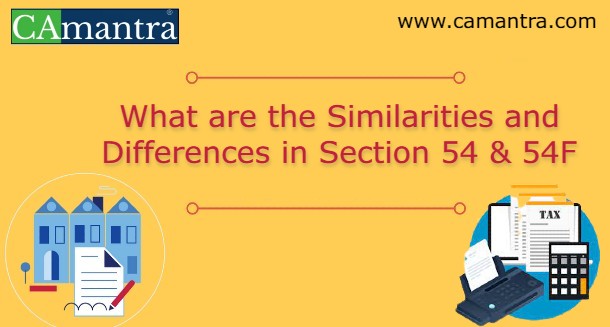The Government of India has provided certain exemptions on purchase or construction of house property which are inducted in the section of 54 & 54F of Income Tax Act 1961. As we know that both Section 54 & Section 54F deal in house property investment on sale of residential house or any asset other capital asset. There are few similarities and differences between these sections of income tax which are explained below for easy understanding.
What are the Similarities?
- Exemption from capital gain is claimed through making investment in construction or purchase of residential house property.
- Exemption is available if investment in house property is made before 1 year from the date of transfer and 2 years after the date of transfer of residential house or any other capital asset in case new residential house is purchased or 3 years from the date of transfer in case new residential house is constructed.
- Exemption is available in case new house property is transferred within 3 years of their purchase or construction as the case may be and the amount claimed as exemption is taxable in the year in which new residential house property is sold.
- In the case of flat allotment under self-financing DDA’s scheme or cooperative societies’s other similar schemes are treated as construction for this purpose. Refer to CBDT Circular No. 672 dated December 16, 1993
- Exemption is withdrawn to HUF & Individual.
- The new house property which is purchased or constructed within time limit must have situated in India (From AY 2015-16)
- Construction’s date of commencement is not relevant in both the sections of income tax. Construction may start even before transfer of house property or capital asset. Commissioner of Income-Tax (CIT) vs J.R. Subhramaya Bhat (1986) 165 ITR 571 (Kar.)
- Exemption is claimed in case net consideration/capital gain is invested according to the mandate of section 54/54F before due date of filing of Income Tax under section 139(1) for the year in which transfer of property has been done.
- In both the sections it is prescribed that in 3 years from date of transfer of residential house or capital asset if amount is not invested in purchase or construction of residential house then the amount of capital gain which was claimed as exemption will become taxable in the year in which period of 3 year expires.
- In both the sections there is no other place where prescribed that same money has to be used for making investment in house property. Ishwar Singh Chawla V/S Commissioner of Income-Tax (CIT) (2010) 130 TTJ Mum 108, Muneer Khan V/S ITO (2010) 41 SOT 505 (Hyd.)
- There is no need of filing of income tax return only for claiming exemption under section 54 & 54F. Income tax return may be filed for other purposes like claiming refund and overall income is taxable.
- If whole of the consideration is paid and possession of the house is acquired, the exemption contemplated in Section 54 & section 54F is clearly attracted. Commissioner Of Income-Tax (CIT) V/S Laxmichand Narpal Nagda (1995) 211 ITR 804 (Bombay). If substantial amount is paid as purchase agreement within the prescribed period, the exemption under section 54 is available, even if possession is handed over after the adherent period. Commissioner Of Income-Tax (CIT) V/S R.L. Sood 245 ITR 727 (Delhi).
- An individual who is minor can claim the benefit of section 54F when income is taxable in the hands of minor child even if his father has two house properties in his name. Commissioner of Income-Tax (CIT) V/S Madan Lal Bassi (2004) 88 ITD 557 (Chandigarh).
What are the Differences?
- In the Section 54, exemption is available in the case where residential house is sold and in Section 54F exemption is available in the where case any capital asset other than residential house is transferred.
- In Section 54 exemption is available in the case where only long term capital gain is invested in purchase or construction of one house property which are residential. The net sales consideration has to be invested in purchase or construction of residential house property as per the section 54F. With effect from AY 2020-21, a taxpayer has an option to do investment in two residential house properties in India to claim exemption from section 54. This option can be used by the taxpayer only once in his/her lifetime provided the amount of long-term capital gain does not exceed INR 2 crores
- In Section 54 there is no limit on how many residential houses you own on the date of transfer of residential house property whose capital gain tax is required to be claimed as exemption but in the Section 54F exemption is not available in case the transfer or hold more than one residential house property on the date of transfer.
- In Section 54 after claiming exemption an assessee can purchase any other house property and in Section 54F if an assessee purchases any other house property other than the new house within 2 years or constructs within 3 years of transfer of capital asset the exemption so claimed is withdrawn.

